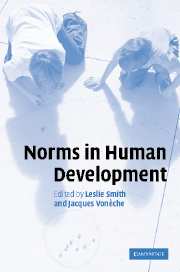Book contents
- Frontmatter
- Contents
- List of figures
- List of tables
- List of contributors
- Acknowledgments
- 1 Norms in human development: introduction
- Part I Norms and development in epistemology
- 2 The implicit normativity of developmental psychology
- 3 Developmental normativity and normative development
- 4 Genetic epistemology: naturalistic epistemology vs normative epistemology
- 5 Norms and normative facts in human development
- Part II Norms in moral and social development
- Part III Norms in cognitive development
- References
- Index
4 - Genetic epistemology: naturalistic epistemology vs normative epistemology
Published online by Cambridge University Press: 22 September 2009
- Frontmatter
- Contents
- List of figures
- List of tables
- List of contributors
- Acknowledgments
- 1 Norms in human development: introduction
- Part I Norms and development in epistemology
- 2 The implicit normativity of developmental psychology
- 3 Developmental normativity and normative development
- 4 Genetic epistemology: naturalistic epistemology vs normative epistemology
- 5 Norms and normative facts in human development
- Part II Norms in moral and social development
- Part III Norms in cognitive development
- References
- Index
Summary
Introduction: the rise of naturalistic epistemology
The period of the 1960s produced several monumental revolutions in a variety of disciplines. This was true, for example, of the cognitive revolution in which not only did psychology take a cognitive turn, but a new combination of disciplines – the cognitive sciences – also emerged. Although psychologists are well aware of both of these revolutions, there was another revolution that occurred in a sister discipline – philosophy – that has escaped the attention of many psychologists. This was an epistemological revolution – the rise of naturalistic epistemology (NE). (For an introductory survey, see Kitcher, 1992; Maffie, 1990.)
This epistemological movement can correctly be called a revolution because it claimed to be doing epistemology in a new and non-traditional way, one that broke radically and completely with the past. It had its major defenders, most notably Willard Quine (1969), who christened this heretical movement – naturalistic epistemology; but there were several other contemporaries who were making similar claims, e.g. David Armstrong (1973), Paul Churchland (1979), Alvin Goldman (1986), Larry Laudan (1987), etc.; in fact, many individuals claim that John Dewey was one of the first naturalistic epistemologists, whose ancestry can be traced back to nineteenth-century thinkers (e.g. Helmholtz, Mach) and even earlier (e.g. Hume).
Naturalistic epistemology
Although there is no universal agreement among naturalistic epistemologists about all of the basic tenets of NE, there is substantial consensus. I would like to suggest the following as fundamental principles of NE, widely shared by naturalistic epistemologists.
- Type
- Chapter
- Information
- Norms in Human Development , pp. 77 - 102Publisher: Cambridge University PressPrint publication year: 2006
- 1
- Cited by



